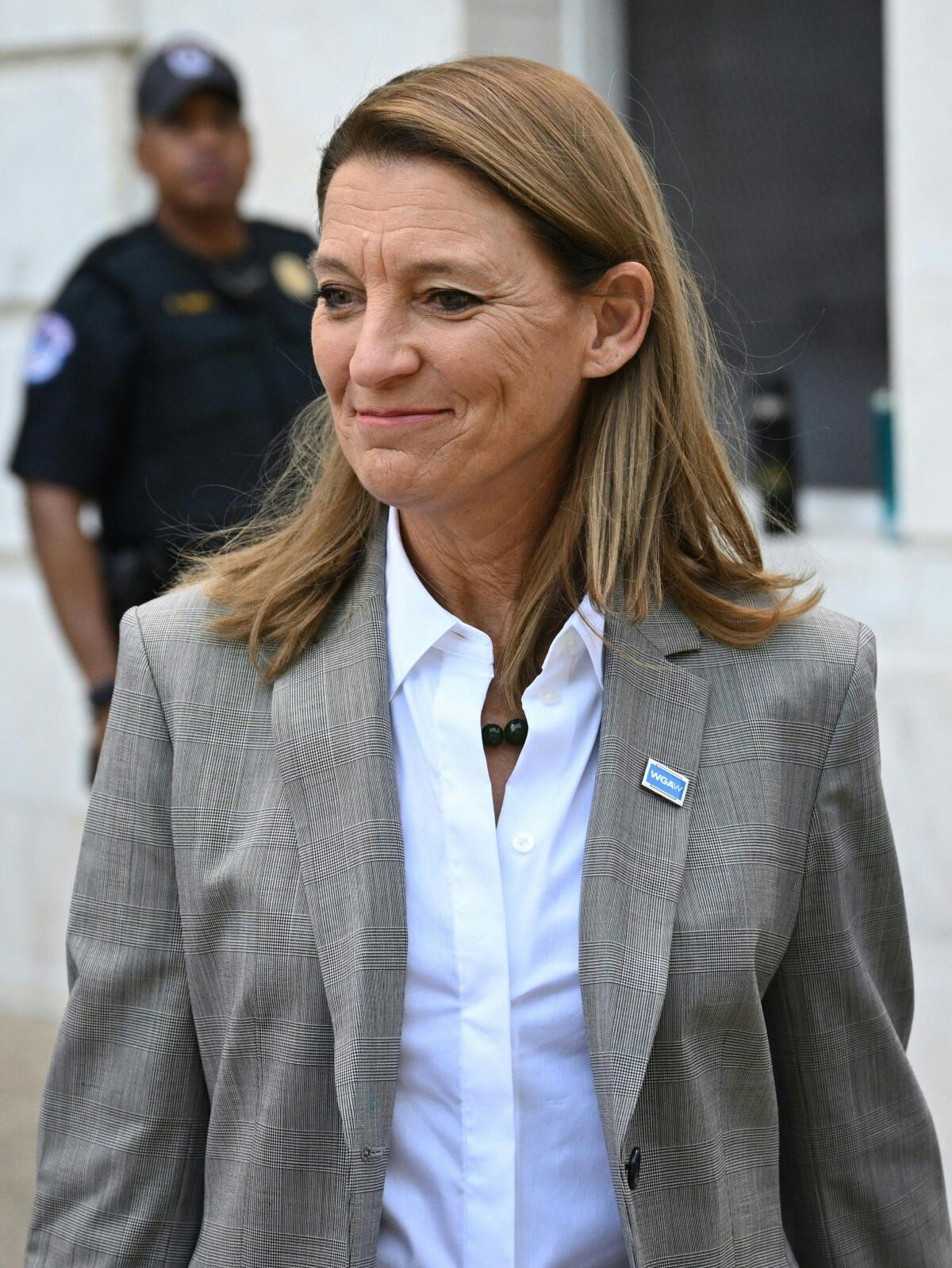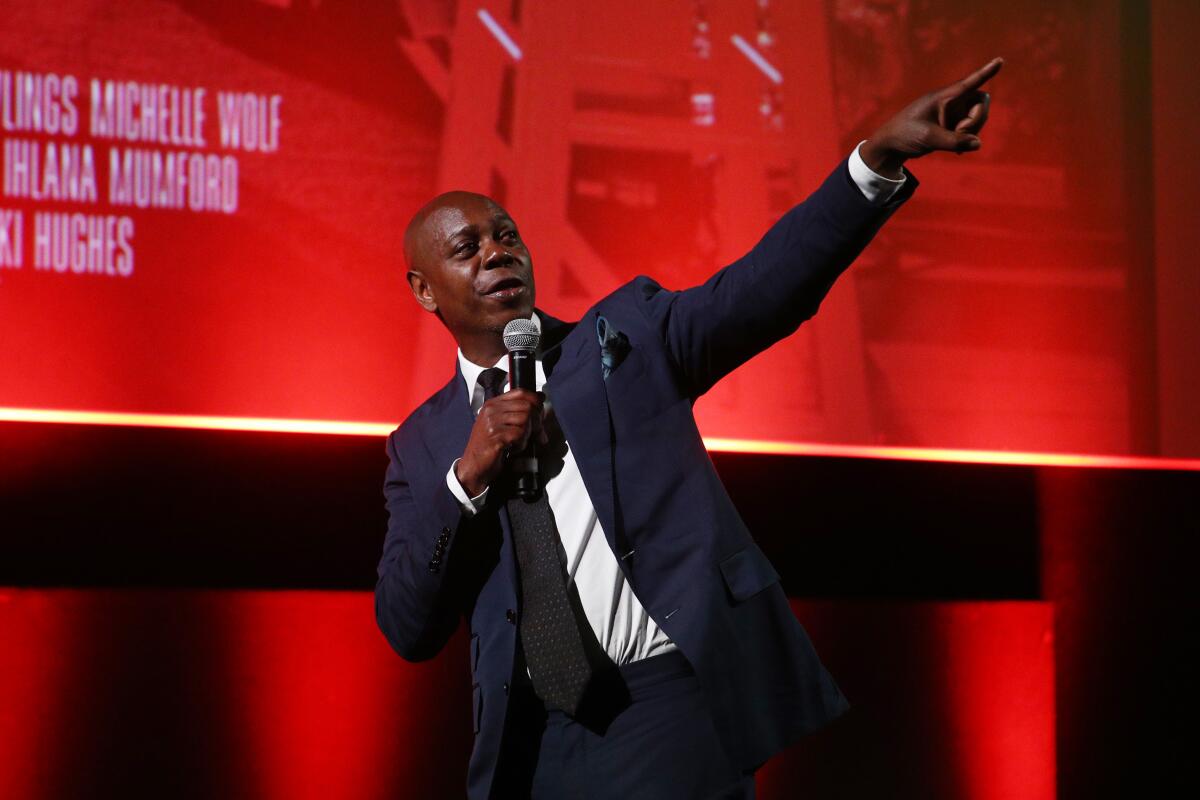
Nerves are fraying. Relationships are being strained to the breaking point. Words are being wielded like weapons.
In the weeks since Hamas’ brutal Oct. 7 attack on Israel, amid a deepening humanitarian crisis in Gaza and growing fears of further escalation of the conflict, reverberations and recriminations have spread around the globe to college campuses, corporate boardrooms and the streets of many major cities. And Hollywood, where reality often takes a back seat to fantasy, is no exception.
For the entertainment industry, which has already been roiled this year by a bitter, historic double strike of writers and actors, the outbreak of violence has created a new set of fault lines. On social media, in public statements and within organizations, the ongoing Middle East conflict — like earlier reckonings sparked by the #MeToo movement and the murder of George Floyd — has unleashed wrenching emotions and scrambled long-standing alliances.
Just weeks after resolving its nearly five-month strike, the Writers Guild of America has seen its solidarity fracture in recent days, with hundreds of writers protesting the union’s silence over the conflict and some threatening to resign from the group.
On Tuesday, the guild’s leadership sent an email to its 11,500 members, apologizing for the “tremendous pain” it had caused by not issuing a public statement on the conflict, explaining, “It can be an imprecise science for a labor union to pick and choose where it weighs in on both domestic and world affairs.”
Maha Dakhil attends the 2023 “Kering Women in Motion Award” during the 76th annual Cannes film festival on May 21 in France.
(Mike Coppola / Getty Images)
In another recent flashpoint, Creative Artists Agency on Sunday confirmed that Maha Dakhil, a prominent agent with clients including Tom Cruise, Reese Witherspoon and Madonna, was stepping aside from her leadership roles at the company after she reposted inflammatory comments on Instagram calling Israel’s response to Hamas “genocide.” While many applauded the move, others saw it as a chilling example of free speech being stifled.
“Clearly in Hollywood everybody’s trying to figure out how to deal with this,” says Stephen Galloway, dean of Chapman University’s film school. “It’s an unbelievably hard issue because many people want to support Israel and yet also are horrified by the deaths of innocent Palestinians. Everything now is so fraught.”
Support for Israel has historically been strong in Hollywood; the founding of the country in 1948 was greeted with a jubilant celebration at the Hollywood Bowl, as was its victory in 1967’s Six-Day War. In the wake of the devastating Hamas raids, with more than 1,400 Israeli citizens killed and more than 200 others taken hostage, including young children and elderly women, many in the industry were quick to condemn the violence.
On Oct. 12, more than 700 celebrities and industry leaders, including Gal Gadot, Bryan Lourd, Jamie Lee Curtis and Ryan Murphy, signed an open letter calling Hamas’ actions “evil” and “barbaric.” The Directors Guild of America and the Screen Actors Guild issued similar statements.

Meredith Stiehm, president of the Writers Guild of America West (WGAW), arrives for a bipartisan AI insight forum at the Russell Senate Office Building on Capitol Hill in Washington on Sept. 13.
(Mandel Ngan / AFP via Getty Images)
The writers guild, however, put out no such message, with WGA West President Meredith Stiehm explaining in an email to members that its board found “consensus out of reach” on how to respond to such a contentious issue.
Outraged by the union’s silence, on Oct. 15 more than 300 writers including luminaries like Eric Roth, Matthew Weiner, Jenji Kohan and Amy Sherman-Palladino, signed an open letter, pointing out that the union had weighed in publicly on other causes, such as the #MeToo movement and Black Lives Matter.
“The conflict between Israel and the Palestinian people is complex and full of nuance, but the crimes committed on October 7th were simple and cruel,” the letter reads, in part. “If we cannot stand up to call it what it is — a monstrous act of barbarity — then we have lost the plot.”
Marc Guggenheim, a showrunner who signed the letter, said he decided to withhold his dues from the WGA in protest. “As a 23-year member, I’ve never been so disappointed in the guild,” Guggenheim said. “Honestly, that’s shameful. If you can’t reach a consensus on condemning terrorism then what could you possibly reach consensus on?”
Screenwriter Dan Gordon, who served in the Israeli military during 1973’s Yom Kippur War and has written such films as “Wyatt Earp” and “The Hurricane,” said Tuesday that he will resign his membership in WGA West and give up his voting rights in the union.
“The failure of the Guild’s leadership to issue even the mildest condemnation of the worst massacre of a religious minority in the Middle East since ISIS carried out similar atrocities against the Yezidis is appalling,” Gordon wrote in a letter to WGA West staff. “It is corrosive to me as a writer and repugnant to every fiber of my being as a person of conscience … I no longer wish to be a fellow traveler with those who hide behind the fetid veil of a morally bankrupt wokeism and stand silent in the face of unadulterated evil.”
Speaking to The Times, Gordon said the guild has been at the forefront of difficult moral issues, including against McCarthyism in the 1950s.
“It’s what writers do,” he said. “It’s part of our raison d’être to take moral stands in the world for things that that demand those stands, and at the very least, not to be silent.”
In its Tuesday email, guild leaders tried to tamp down the furor, writing, “When we made the difficult choice not to make a statement, it was not because we are paralyzed by factionalism or masking hateful views. We are American labor leaders, aware of our limitations and humbled by the magnitude of this conflict. However, we understand this has caused tremendous pain and for that we are truly sorry.”
Not all writers thought it necessary for the WGA to weigh in. Alex O’Keefe, who has written for the FX series “The Bear,” argued that the WGA, which recently signed a new contract with the major film and TV studios, should focus on helping its members get back to work.
“The WGA doesn’t have a standing army and the concern of our union should be helping rebuild our careers and protecting our free speech,” O’Keefe said. “When one writer gets silenced, we are all quieter. Our voices are all dim.”
Even as many have come to Israel’s defense, others in the entertainment industry have used their voices to highlight the plight of innocent Palestinian civilians trapped under fire, reviving debates that divided Hollywood in 2014 over Israel’s incursion into Gaza, which sparked seven weeks of deadly fighting in the region.
On Oct. 17, the group Artists for Palestine UK issued an open letter with more than 2,000 signers, including actors Tilda Swinton, Steve Coogan and Charles Dance, calling for “an end to the unprecedented cruelty being inflicted on Gaza” and calling Israel’s actions “war crimes,” while making no mention of Hamas.
Another open letter released in recent days, signed by dozens of celebrities including Cate Blanchett, Joaquin Phoenix, Jon Stewart, Ramy Youssef and America Ferrera, urged President Biden to call for an immediate ceasefire. “Half of Gaza’s two million residents are children, and more than two thirds are refugees and their descendants being forced to flee their homes,” the letter said. “Humanitarian aid must be allowed to reach them.”

Dave Chappelle addresses guests during a screening for “Dave Chappelle Live in Real Life” at Hoyts Entertainment Quarter on Feb. 7 in Sydney, Australia.
(Don Arnold / Getty Images for Pilot Boy)
Controversial comedian Dave Chappelle drew fire when he weighed in on the conflict last week during a stand-up show in Boston, reportedly spurring some audience members to walk out after he criticized the Israeli government for cutting off water and other resources to the Gaza Strip.
“As a comedian and satirist, he has to navigate the complexities of competing truths, presenting perspectives that can be both thought-provoking and challenging,” a Chappelle spokeswoman told The Times on Monday.
The war has been a particularly thorny issue within talent agencies, as clients and their representatives grapple with opposing views.
After her inflammatory repost from an account called Free Palestine stirred anger and accusations of antisemitism, CAA’s Dakhil, whose client list also includes Israeli-born Natalie Portman, deleted it and offered an apology for using “hurtful language.”
“I’m so grateful to Jewish friends and colleagues who pointed out the implications and further educated me,” Dakhil said in a statement to Variety.
CAA’s swift move to remove Dakhil from her role as co-head of the motion picture department for the time being and as a member of the agency’s internal board quickly drew its own backlash.
“It’s incredibly dangerous that we are not responding with more outrage to companies that are basically trying to control the political views, the values of Americans, in this way,” said Sarah Leah Whitson, executive director of Democracy for the Arab World Now, a think tank focused on U.S. foreign policy in the Middle East.
Among some writers of color, Dakhil’s exit from her leadership positions is a blow, as she was known for championing underrepresented voices in Hollywood. If such a downfall could happen to a top agent like her, they worry what kinds of protections could be offered to them, particularly given recent turnover in diversity and inclusion leadership at studios.
“She’s made an example of,” said one writer of color who declined to be named due to the sensitivity of the issue.
Members of the WGA, SAG-AFTRA and DGA have circulated another petition expressing concern about the “recent pressure campaigns by certain high-profile members of our guilds to issue statements in support of Israel amidst its ongoing siege of Gaza.” That petition was signed only with people’s initials, which one writer said was because of concerns about potential backlash.
Ultimately, Galloway says, for all of the passion and fury currently roiling the industry, the conflict between Israel and Hamas is simply beyond the ability of even Hollywood’s most powerful players to effect meaningful change.
“The entire world is like a tinderbox and one little lit match can set everything on fire,” Galloway said. “People who negotiate deals for a writer’s contract or an actor’s contract are not the people who should be leading the way in solving these problems.”












